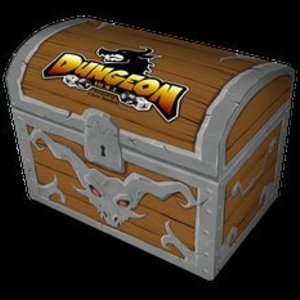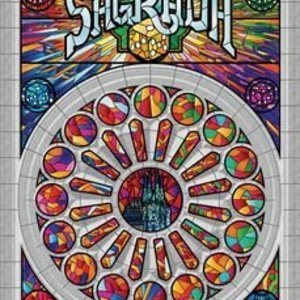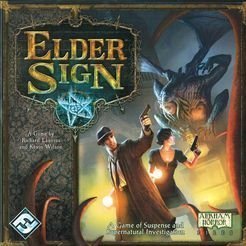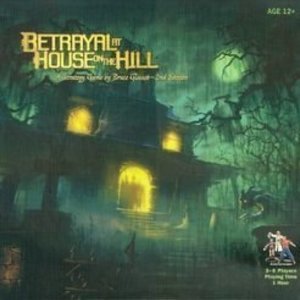
My Kingdom for the Princess HD
Games
App
It offers plenty of hours of entertainment in a simple resource management framework, making it an...
Purple Phoenix Games (2266 KP) rated Dungeon Roll in Tabletop Games
Jun 12, 2019
Dungeon Roll is a quick and fun dice-rolling game where Heroes delve into a dungeon to fight monsters (potentially including a dragon!), find treasure, and gain experience points based on how deep into the dungeon they go. If you are playing in a group or solo, the rules of the game are the same – the only difference is how you win! In group play, the winner is the player with the most experience points after 3 rounds of play. In solo play, you are working to get as many experience points as possible – competing against previous plays trying to best yourself!
After a few runs of Dungeon Roll, it has quickly become one of my favorite games to play solo for two main reasons. First, I like and appreciate the simplicity of the rules. It is quick and easy to learn, and the solo variation has no extra rules or stipulations. Simply put, I don’t have to worry about forgetting solo rules because there aren’t any! Don’t have any other players? Great! Just play like you normally would! Yeah, I may have to roll my own Dungeon Dice, but I don’t have to worry about controlling any ghost players or remembering whether or not I need to start the game with a solo handicap. The simplicity and uniformity of the rules, regardless of player count, means that I don’t have to spend time re-reading the rulebook to refresh my memory on solo play, and can just get down to playing instead!
The next reason why I love to play Dungeon Roll solo is due to the variability and unpredictability of the game. The base game comes with 8 Hero cards, each with unique abilities, and the expansion packs provide even more Hero choices. Different heroes/abilities lend themselves to different strategies for success – there is not one right way to play. Even if you pick to play as the same Hero every game, though, the dice rolling mechanism makes sure that no two games are ever alike. Dice rolling can be a fickle friend, and oftentimes the success (or failure) of a round depends solely on the luck of the roll. I, unfortunately, am a notoriously bad dice-roller…. BUT that helps make this game more interesting for me because it forces me to really strategize how I am going to use my Hero abilities, treasure tokens, and dice to my benefit. Sometimes it works out well and I come out with a respectable score! But then again, sometimes it’s the exact opposite and I come out wondering whether or not I should even log the play with as feeble a score as I got… Either way, dice rolling is unpredictable and that (along with different Hero abilities and treasure tokens) makes for a unique game every time.
Dungeon Roll is a fun and competitive game for both groups and the solo player. This game is deceptively simple and wildly entertaining, and I highly recommend adding it to your solo arsenal!
https://purplephoenixgames.wordpress.com/2018/12/21/solo-chronicles-dungeon-roll/

Sentinels of the Multiverse
Games
App
=============================== “This is a must have addition to your digital board game...

ICC Pro Cricket 2015
Games and Entertainment
App
ICC Pro Cricket 2015 Play the Official Game of the ICC Cricket World Cup 2015. This game features...
Purple Phoenix Games (2266 KP) rated Sagrada in Tabletop Games
Jun 12, 2019
In Sagrada, you are an artist who has been tasked with creating a beautiful stained glass window. Working piece by piece, you build a masterpiece – the likes of which have never before been witnessed. Finding the perfect pieces can be tricky, but through careful use of your tools and with your artistic vision, you can create the best window in the town! The game is played over 10 rounds in which players draft dice and place them in their windows, following certain placement restrictions. A set number of tools are available for use, and can aid you in manipulating the dice to your benefit. Points are scored based on successful completion of private and public objectives, and the player with the highest score at the end of 10 drafting rounds is the winner!
My favorite part about playing Sagrada solo is that the game is essentially played the same way, regardless of player count. The only difference is how you win! In both group and solo play, each player will draft two dice every round. In group play, any leftover dice are discarded, while in solo play, the remaining two dice will be added towards the Target Score – the score you are trying to beat at the end of the game! To find the Target Score, you add all of the die values of your unused dice from each round. If, at the end of the 10 rounds, you have earned more points than the Target Score, you win! But if the Target Score is higher than your final score, you lose.
The game play differences are simple enough, but actually winning the game solo is a different story. I have played Sagrada solo quite a bit, and have won maybe 25% of the time. Depending on which window card and objectives are in play, and because of placement restrictions, I often have to sacrifice high-valued dice to the Target Score. And since there are no placement restrictions for the Target Score, and two dice are added to it each round, it is very easy for that score to sky-rocket. I either barely pull off a win, or I lose by a huge margin. Playing in a group is nicer in this regard because the other players have the same placement restrictions that I have – nobody is just getting points for free. Without the Target Score, there really is no way to play Sagrada solo, but it makes the game feel a little imbalanced to me.
Just because it is difficult to win solo does not mean that I do not like the game. It requires quite a bit of strategy, and that keeps me engaged for the entire game. There are dice placement restrictions based on color AND value, so there are two different ways in which you have to constantly be strategizing. You can’t just focus on either value or color – your strategy must always be changing based on which color dice are drawn and what values are subsequently rolled. Even with the amount of strategy required, Sagrada actually plays pretty quickly as a solo game, and I really like that. I like the challenge of this game, and often try to play until I can win. Since I can finish an entire solo game in probably 10-15 minutes, I am able to get multiple plays in a row!
Sagrada is a challenging game to play solo, but not in a way that feels futile. I don’t win a lot, but the strategic implications and the pretty dice colors are what keep me coming back to this game! If you haven’t tried Sagrada solo yet, I’d encourage you to give it a shot. But be warned – you might not always win.
https://purplephoenixgames.wordpress.com/2019/02/26/solo-chronicles-sagrada/
Purple Phoenix Games (2266 KP) rated Elder Sign in Tabletop Games
Jul 16, 2019 (Updated Aug 21, 2019)
Disclaimer: There are many expansions for Elder Sign. I do not have any of them, nor do I have any gameplay experience with any of them. If and when I do get them added into my base game, I will either amend this review or write a new one! – L
In Elder Sign, players take on the roles of Investigators who must use their supernatural knowledge and keen wit to seal dimensional portals and prevent the Ancient Ones from entering our world and destroying humanity. Just another day at the office, right? Players take turns rolling dice to fight monsters and complete adventures that will reward them with artifacts, health and/or sanity, clues, or even Elder Signs – the symbols necessary for sealing away the Ancient Ones for good. Be careful, though – if you fail to complete an adventure, you will be harshly punished! I’m talking losing health and sanity, accidentally summoning monsters, or even bringing the Ancient One one step closer to our world! As a solo game, Elder Sign plays the same way as it would in a group setting. The only difference is that the solo player cannot use the ‘Assisting’ ability because there are no other players who can offer you aid. Besides that, gameplay remains the same – even a lone Investigator can put their dice to good use to ward off evil!
I enjoy playing Elder Sign as a solo game. Although mostly dominated by dice rolling, there is a fair amount of strategy required for this game. I don’t feel like I’m mindlessly rolling dice – I have to decide which adventures are attainable with my given items, and which rewards benefit me the most in my overall task. There are rewards and consequences to be weighed with every decision, so action must be taken with great thought. Because of the strategic implications, Elder Sign keeps me thoroughly engaged, even when playing solo, and that’s one reason why I keep coming back to it.
On the flip side, one thing that isn’t my favorite about Elder Sign is its reliance on dice rolls to progress in the game. Yeah, I know, it’s a dice game – what did I expect? Sometimes, though, you just can’t roll to save your life (quite literally, in this game) and that can make the game frustrating to play. A series of poor rolls can feel like they completely negate any strategy you’ve enacted and can unravel your entire plan. On a good dice-rolling day for me, I love this game! On a not-so-good dice-rolling day, I find it a little harder to enjoy myself. But hey – if it was totally easy, it wouldn’t be fun, right? One positive of this, I guess, is that I always have to be adjusting my strategy to take the current dice into account. I can’t just pick one strategy and run with it since almost all outcomes are dependent on the luck of the roll! Elder Sign keeps me on my toes, that’s for sure.
I got Elder Sign from Travis as a birthday present last year, and it has been a good addition to my collection. There is enough going on to keep me engaged the entire game, but not so much that I feel overwhelmed. And yeah, maybe I’m not always the greatest dice-roller, but that just makes me adapt my strategy to deal with the current situation. I have read that adding expansions makes the game even more enjoyable, and hopefully one of these days I’ll get to experience that for myself. For the time being, though, I’m content with the base game. If you enjoy Elder Sign, I recommend you try it solo – it doesn’t feel any different to play, and I think you’ll enjoy it just as much as a group game!
Purple Phoenix Games (2266 KP) rated Arctic Scavengers in Tabletop Games
Jun 12, 2019
Welcome to the Ice Age. No, not the animated movie. I’m talking about the real deal. Arctic Scavengers is set in a post-apocalyptic ice age where the cold is deadly and the resources are scarce. Any surviving humans have banded together to form ‘tribes’ that are competing for dominance in this frigid tundra. Can you and your tribe outwit your competitors to become the most powerful group? Or will a bigger and more menacing tribe overpower you and jeopardize your survival?
Disclaimer: The solo variant is only addressed in the Recon Expansion rules. There IS another expansion – HQ – but I have not used that content in my solo plays. This review only encompasses the Base Game and Recon Expansion.
Arctic Scavengers is a deck-building game where players are recruiting mercenaries to their tribes, searching for general resources, and battling other tribes for contested resources. Each turn has two main phases – Resource Gathering and Skirmish. During Resource Gathering, you play cards from your hand to either recruit new mercenaries or search the junkyard for general resources. Any remaining cards in your hand are then used during the Skirmish phase – where the player with the highest ‘fight’ value wins the contested resource for that round. At the end of the game, the player with the biggest tribe wins!
The solo variant has some minor differences, but is played essentially the same way. In a solo game, the contested resource cards are divided into 7 skirmishes to be encountered throughout the game. You can decide when to engage in a skirmish – it is not a requirement to encounter one each turn. After each skirmish, you either win and earn a contested resource, or lose and must permanently discard a card from your losing hand. The game ends when all 7 skirmishes have been encountered. The other difference is that each time you have to re-shuffle your discard pile, you must permanently remove the top card of your new deck from the game. Beyond those changes, the game remains the same. At the end of the game, all cards in your tribe are worth certain numbers of points – the goal is to beat your own personal best score.
In theory, this game sounds super cool! But when I actually got to play it solo, I was seriously underwhelmed. The game feels stagnant in the sense that there is no tension or urgency in your strategy. Since YOU get to decide when to engage in a skirmish, it is possible to just while away the time building up your deck until you have enough cards to beat every skirmish. Yes, you permanently discard a card each time you re-shuffle your discard pile, but if you are able to recruit one or two new cards each turn, it negates the penalty of discarding a card. The ability to choose when to engage in skirmishes is seriously over-powered because there is nothing stopping you from ignoring skirmishes and amassing cards for end-game scoring.
The other grievance I have with the game is regarding the Junkyard – the deck of cards where you ‘search’ for resources. The solo rules do not explicitly address setting up the Junkyard deck at all. So do you use one or not? Not having the Junkyard deck can be a serious hinderance – certain mercenaries cannot be recruited without certain resources. If you DO play with the Junkyard, how many cards do you use? Do you use the corresponding cards from the Base game and BOTH expansions? Only Base game and one expansion? Again, not explicitly addressed. I’ve tried using all of the Junkyard cards and that is difficult – there are just too many cards in that deck. I have gone entire games without coming across a necessary resource just because the size of the deck is too large (and I’m apparently a poor card-shuffler). The simple solution to this ambiguity would have been to just address it in the rulebook. But it’s not there, so I’m left guessing as to how I should set it up every time.
I really like the idea of this game. I really don’t like the solo variant though. Not having forced skirmishes makes the game extremely boring for me – I don’t really need a strategy since I can just recruit cards until I can draw a powerful hand. If there was a timeline for skirmishes – maybe something like “You must encounter one skirmish every other turn” – the game would be vastly different. I would actually need to strategize what cards to recruit and how I should delegate my cards on turns with a skirmish. In most games, I will reach a certain point where I choose to encounter a skirmish (that I know I will lose) just because I am starting to get bored. I appreciate the sentiment of including a solo variant, but this one just does not work.
Arctic Scavengers requires decent strategy and it offers good player interaction in group games. In a solo game, however, it is just imbalanced and boring. This is one solo variant that I would not recommend that you try, unless you are including drastic house rules.
https://purplephoenixgames.wordpress.com/2019/03/06/solo-chronicles-arctic-scavengers/
Connie (244 KP) rated Betrayal at House on the Hill in Tabletop Games
Jun 4, 2018
This game has high replayablity value, which I always look for in games. I haven't managed to play all the haunts yet, but there are character-specific haunts, haunts with hidden traitors, no traitors (everyone for themselves or everyone against NPC) single traitors or even traitors that switch based on certain criteria. There are 50 original haunts, while the expansion adds 50 more, which is a heck of a lot of content for a board game!
There are a LOT of rules, especially when the haunt starts, but that's not too much of an issue. If the rules don't cover it explicitly, my gaming group agrees on one as it comes up, though you could probably Google them. I still consult the rules of games like Monopoly and Life, so looking back to the rules doesn't bother me. And I LOVE that each team has different rules/conditions for winning!
I would advise having someone who knows how to play joining you at first, to smooth over any confusion, but it's not really necessary.
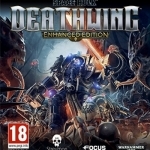
Space Hulk: Deathwing Enhanced Edition
Video Game Watch
Space Hulk Deathwing Enhanced Edition is a First-Person Shooter based on Games Workshop’s cult...
shooter
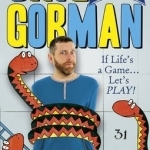
Dave Gorman Vs the Rest of the World
Book
Remember when you were a kid, and you used to go round to a friend's house to see if they were...
